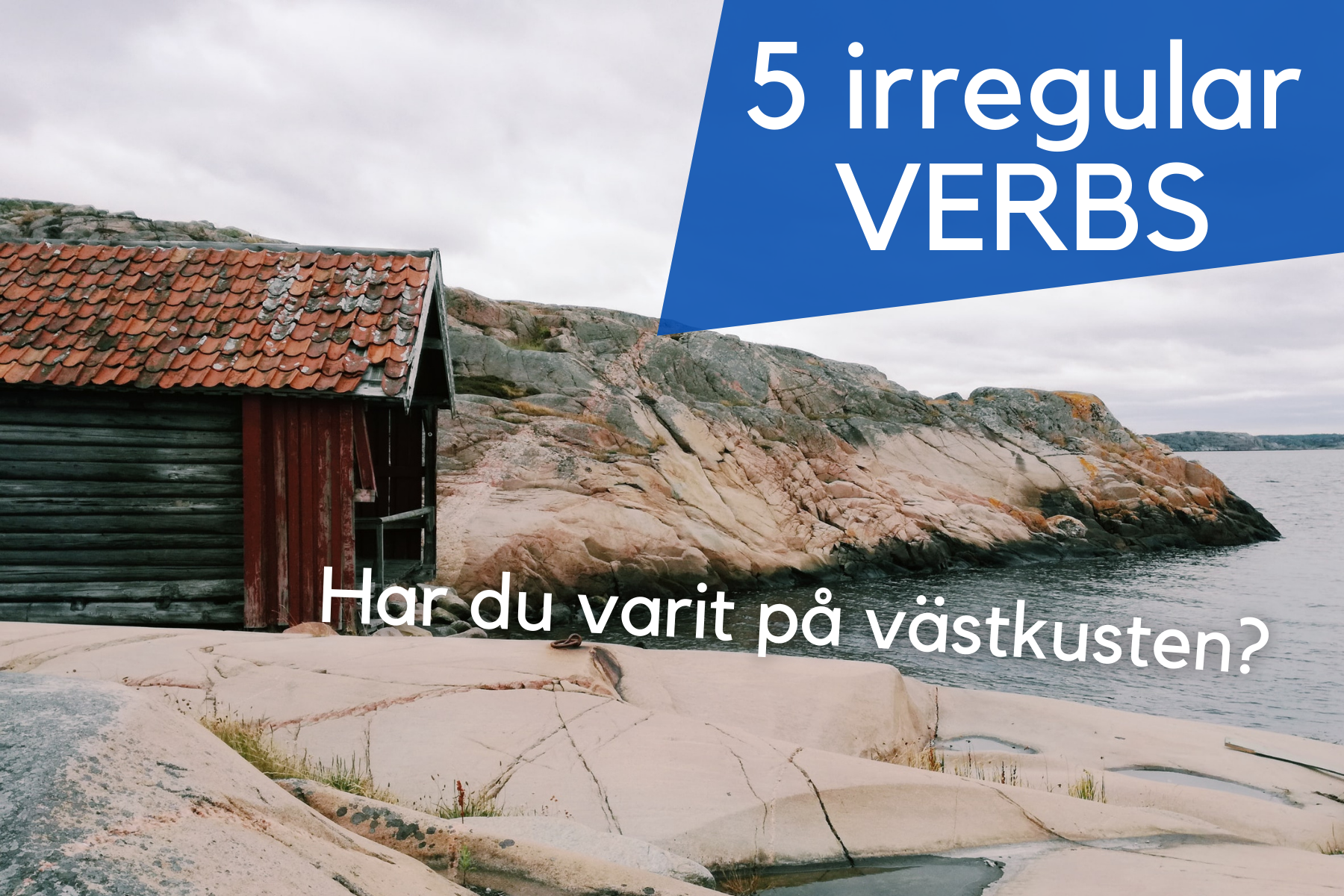5 Irregular Swedish Verbs You Need to Master Posted by Chelsea B on Nov 19, 2021 in Grammar, Uncategorized, Vocabulary
A student recently reminded me how difficult it is to memorize irregular verbs in your foreign language. Well actually, she said, “Swedish irregular verbs are the worst.” Att vara, att se, att göra, to name a few, are among the most common words used in daily Swedish. Just as language learning is a balance of dedication and memorization, nailing these verbs is no different. Below are conjugations and example sentences using 5 Swedish irregular verbs that you must master.
What makes these verbs irregular?
Simply put, irregular verbs don’t follow patterns quite like the other verb groups. Oftentimes, the vowel changes between the tenses. For a comprehensive explanation of the verb groups, check out learningswedish.se’s site. In this post, I’ll conjugate each of the following 5 verbs in infinitiv, presens, preteritum, and supinum tenses along with example sentences in each tense. I’ve left out the imperativ tense here but never fear, your chance to practice the imperative form is in this blog: Bake Swedish Cinnamon Buns Using Imperative Verbs!
1. To be or not to be? VERB: att vara
Beginners can say, jag är, han är all day long, but often stumble on the other forms of the verb att vara, “to be”.
infinitive present past perfect past
att vara är var har varit
to be am/is were has been/have been
Han tycker inte om att vara för varm. He doesn’t like to be too warm.
Jag är en soffpotatis på vintern. I am a couch potato in the winter.
Det var svårt att förstå vad de sade. It was difficult to understand what they said.
–Har du varit på västkusten? -Have you been to the West Coast?
–Nej, jag har aldrig varit på västkusten. -No, I have never been to the West Coast.
2. Everyone has to eat! VERB: att äta
infinitive present past perfect past
att äta äter åt har ätit
to eat eat/eats ate have eaten
Alla behöver äta ungefär 500 gram grönsaker varje dag.
Everyone needs to eat about 500 grams of vegetables every day.
Äter Oskar fisk? Does Oskar eat fish?
Vi åt sushi flera gånger i Japan. We ate sushi several times in Japan.
Nej tack, jag har redan ätit lunch. No thanks, I have already eaten lunch.
3. Do it! Make it! VERB: att göra
infinitive present past perfect past
att göra gör gjorde har gjort
to do/to make do/does did have done
Snälla pappa, kan vi göra saffransbullar idag?
Please dad, can we make saffron buns today?
-Vad gör du? -What are you doing?
-Jag tittar på Natalies fotbollsmatch. -I am watching Natalie’s soccer game.
Note that when someone in Swedish asks, “vad gör du? (what are you doing?)” you should omit the verb gör in your answer unless you are making something, then use gör indeed! For example:
-Vad gör du? -What are you doing?
-Jag gör julkort! -I am making Christmas cards.
-Vad gjorde ni på semestern?
-Vi besökte 3 nationalparker och vandrade!
-What did you all do on vacation?
-We visited 3 national parks and hiked!
Henrik har aldrig gjort det själv.
Henrik has never done it himself.
4. Did you see that? Yes, I saw it! VERB: att se
infinitive present past perfect past
att se ser såg har sett
to see see/s saw have seen
Vill du se Spidelmannen eller Frost på bio?
Do you want to see Spider-Man or Frozen at the movie theater?
Hur mår Jessica? Hon ser lite trött ut*.
How is Jessica? She looks a little tired.
*ser ut – to look/or resemble
Kom Erika till konferensen? Vi såg aldrig henne.
Did Erika come to the conference? We never saw her.
Har du sett Valkyrian på Kungliga Operan?
Have you seen The Valkyrie at the Royal Swedish Opera?
5. Let’s go! Want to walk?! VERB: att gå
infinitive present past perfect past
att gå går gick har gått
to go/walk go/goes went have gone
Det börjar bli sent! Ska vi gå?
It’s starting to get late. Shall we go?
Cyklar du eller går du till äffaren?
Do you bike or walk to the store?
-Hur gick det på jobbet idag? -How did it go at work today?
-Det gick bra tror jag! -It went well I think!
-Hej, var är du? Har du gått hem?
-Hi, where are you? Have you gone home?
Now it’s time to practice! Don’t give up on these irregular verbs because you’ll need to use them ALL the time. Besides these ones, which Swedish verbs trip you up?

Build vocabulary, practice pronunciation, and more with Transparent Language Online. Available anytime, anywhere, on any device.






Comments:
Sherman Rosen:
Chelsea, Your explanations are so crystal clear and good-natured. Many thanks.